A glimpse into the Literature Archive Salzburg
Stefan Zweig’s Marie Antoinette
Jottings and the manuscript of the chapter “Geheimnis des Alcovens“
The biography Marie Antoinette – Bildnis eines mittleren Charakters, published in 1932, was one of Stefan Zweig’s most successful books. Zweig lived in Salzburg whilst writing.
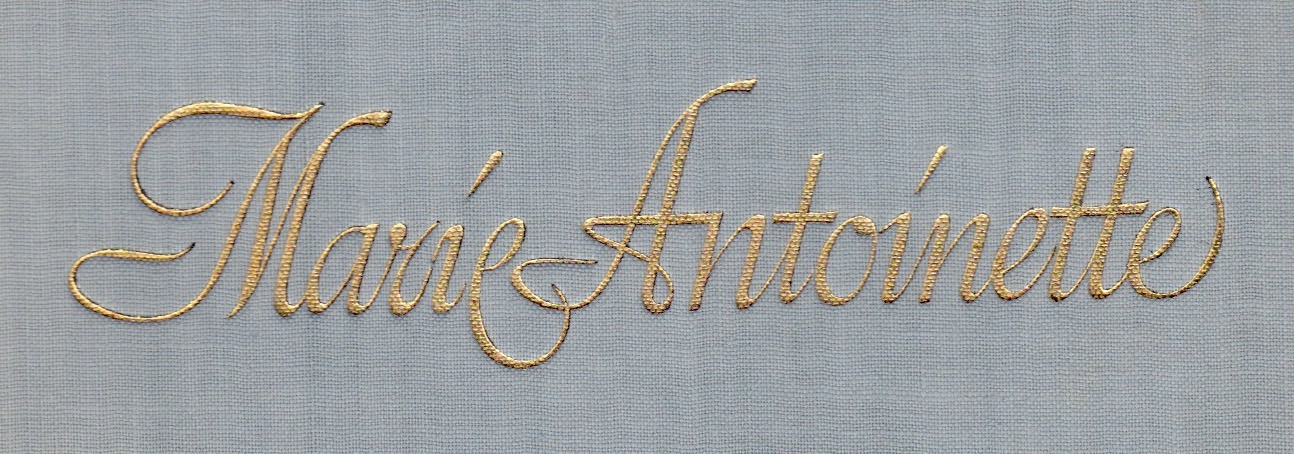
Marie Antoinette, Lettering from the first edition 1932
The genesis of this biography is particularly well documented by orginal documents. These include the notebook and manuscript on display in the exhibition, both of which focus on the chapter entitled Geheimnis des Alcovens. In this chapter, Zweig describes Marie Antoinette’s the marital problems with the French dauphin and later King Louis XVI. Zweig decided to scrap the chapter for a later revision of the book, not least due to the critique from his contemporaries of its overly permissive passages – he went on to incorporate parts into other chapters.
Jottings in the notebook are presumably the first version of the later second chapter of Marie Antoinette. As was customary for Zweig in this phase of his work, the notes are written in pencil. They often consist of incomplete, not yet fully formulated sentences.
The next stage of editing this chapter has also been preserved as a manuscript. The text, jotted down in ink, was not yet in its final form and was still undergoing Zweig’s constant revision. Despite this, Zweig had decided on a name for the chapter; “Geheimnis des Alcovens“.
Website „Stefan Zweig digital“, Literaturarchiv Salzburg
Stefan Zweig digital
Further documentation and information on Zweig’s biographical novel “Marie Antoinette” can be found on a dedicated page.
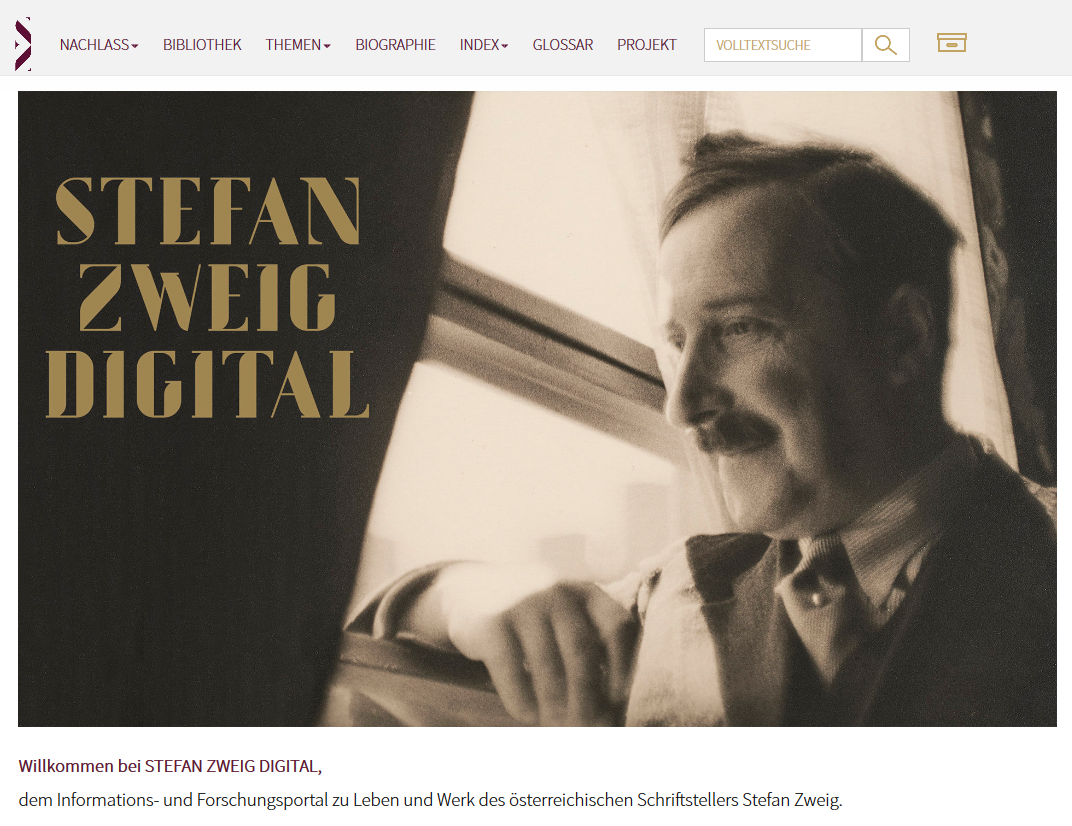
The Literature Archive’s information and research portal on Zweig’s life and work was created by Oliver Matuschek and Lina Maria Zangerl. The platform offers visitors the chance to browse the collection online.
Stefan Zweig Centre Salzburg Website
Stefan Zweig Centre
This internationally active research and event centre at the PLUS is also dedicated to disseminating the work of Stefan Zweig.
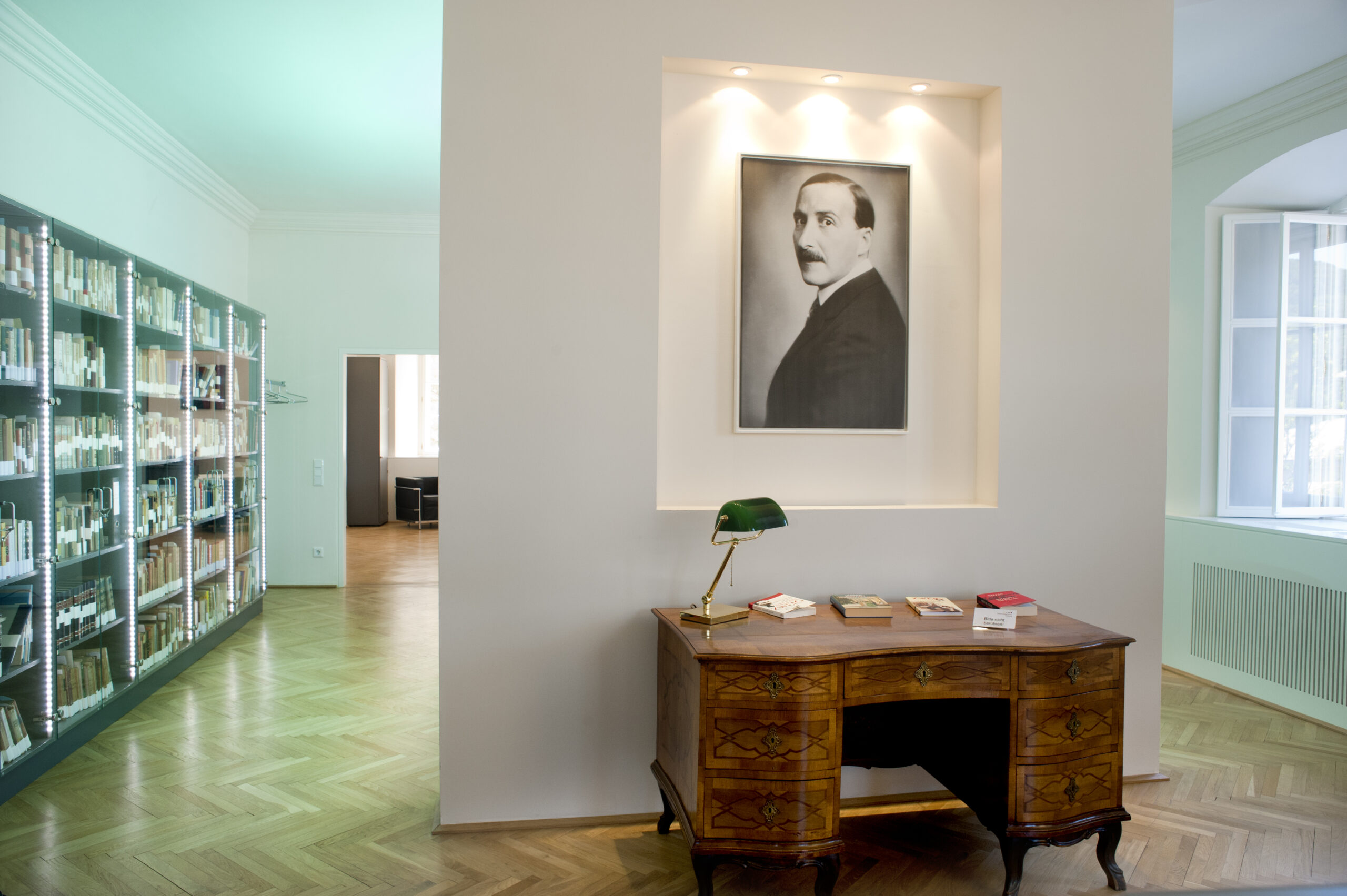
Thomas Bernhard and Peter Handke – a trial and a tribute
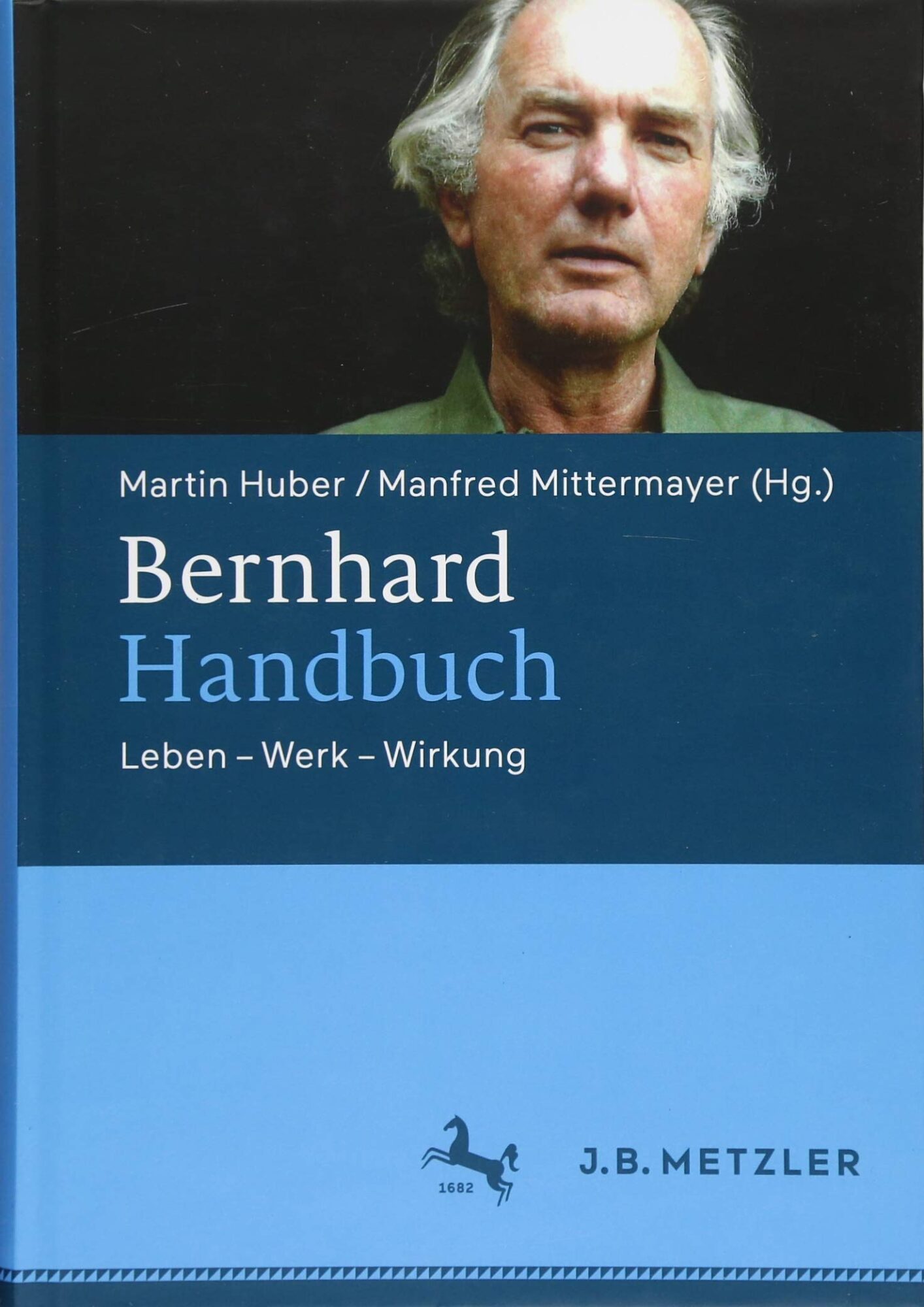
When Thomas Bernhard’s first autobiographical volume Die Ursache. Eine Andeutung was published, the real-life “Onkel Franz” (Uncle Franz) filed a lawsuit against Bernhard and his publisher Wolfgang Schaffler for libel and defamation of honour. After several judicial proceedings, both parties agreed on a settlement in May 1977; the disputed passages were deleted from future editions.
In this letter of 26 April 1977 to Schaffler, Bernhard was still uncompromising in his approach:
„Lieber Herr Schaffler, / bevor ich abreise, Folgendes: / ich kann u. will in d. „Ursache“ / nichts ändern, kein Wort, u. / keines ‚tilgen‘, es bleibt / alles, wie es ist – u. ich / laße [!] es auf den Prozess / ankommen. / Ich werde zu Gericht gehn, / gleich, wie es ausgeht. / Ich ändere nichts! / Bitte veranlaßen [!] Sie alles / in diesem einzigen mir / möglichen Sinn. / Kommt eine neue Ausgabe, / muß sie erscheinen, wie die / 1. Ausgabe. […]“
(“Dear Mr. Schaffler, / before I leave, I would like to say the following: / I can’t and don’t want to change anything in the “Ursache“, not a word, and / not ‘erase’ anything, everything remains / as it is – and I / will let it go to trial. / I will go to court, / no matter the outcome. / I won’t change anything! / Please arrange everything in what is for me the only sensible way. / If a new edition is published, / it must appear look identical to the / first edition. […]”)
The Literature Archive has been researching Thomas Bernhard for several years; the most comprehensive project is the Bernhard-Handbuch (edited by Martin Huber and Manfred Mittermayer, in collaboration with Bernhard Judex), which was published in 2018.
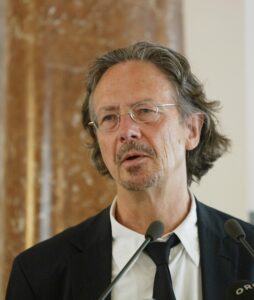
A few hours before being awarded an honorary doctorate by the Paris Lodron University of Salzburg on 18 June 2003, Peter Handke, on a walk in Anif near Salzburg, jotted down a few key words on the back of a telegram from Hubert Burda’s Munich office for the speech he later gave at the ceremony (see photo). He left this “concept sheet” as a gift to Adolf Haslinger, the founder of the Salzburg Literature Archive Foundation (now named after him). The transcription of the speech recorded by ORF was published in 2004 under the title Einige Anmerkungen zum Da- und Dort-Sein by the Salzburg publishing house Jung und Jung.
Here are some characteristic passages from the manuscript page shown in the exhibition:
„Am-Rand-Sein –, Im-Eck-Sein / ein paar Aperçus über Da– und Dort-Sein, / Vorhandensein, Erscheinen, In E. Treten / Überall- und Nirgendssein / Verschwinden, Idioten einst / und jetzt“ [top], „sehr vieles, was öfftl. wird, ist nirgends da / zuhause, bei sich: da – aber wenige bleiben zuhause bei / sich“ [middle], „privat, öffentl. (Antike: heute, Idioten, die nicht in d. / Polis waren – heute: nicht unbedingt die Abseitsstehenden die / Idioten)“ [below].
The mention of Zdeněk Adamec, to whom Handke dedicated his most recent Salzburg Festival play (2020), is particularly noteworthy.
The complete documentation of the genesis of Handke’s most important dramas stands out among the numerous archival materials in the Literature Archive: Storm Still (“Immer noch Sturm”, Salzburg Festival 2011). Here you can see a particularly noteworthy manuscript page, also in terms of content.
The Literature Archives dedicates a major edition project to one of Austria’s most important female authors:
Ingeborg Bachmann
The Salzburg Bachmann Edition was first published in 2017.
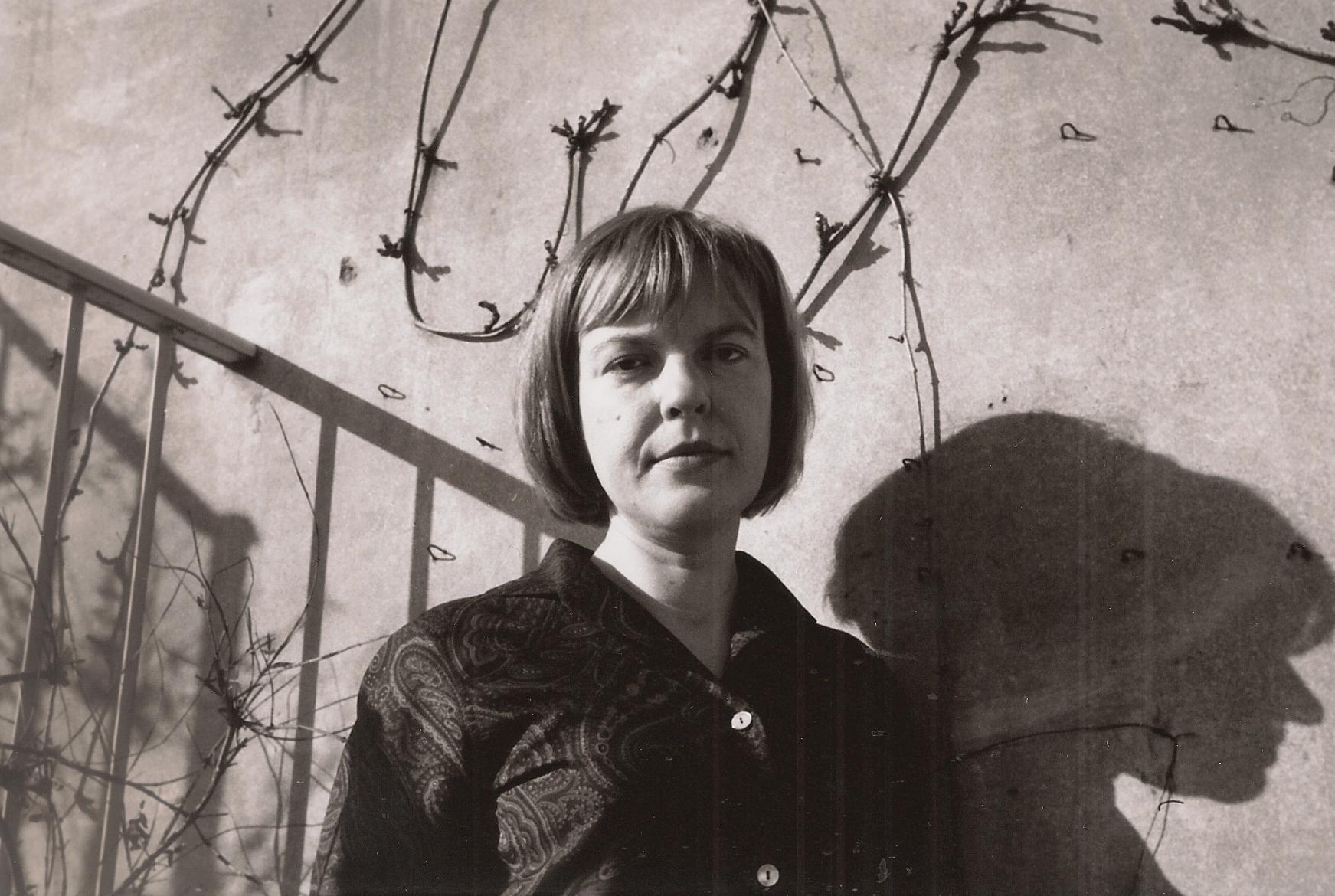
Hans Höller, who had established a research focus on Ingeborg Bachmann at the University of Salzburg, co-edited the edition with Irene Fußl until 2021 (collaboration: Silvia Bengesser); in the meantime, Uta Degner (Department of German Language and Literature) has taken over his role. The critical study edition of the works and letters makes up parts of the estate, which were kept classified until 2025, accessible for the first time: the collection of letters as well as about 500 other previously unpublished pages.
Texts: Manfred Mittermayer, Lina Maria Zangerl | Translation: Leonie Young
Photos: © PLUS, Literaturachiv Salzburg (1, 2) | © Luigi Caputo (3) | © Erika Schmied (Coverfoto) (4) | © Doris Wild (5) | © Heinz Bachmann (6)




